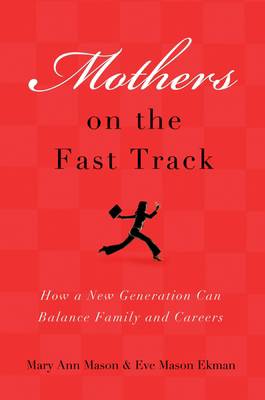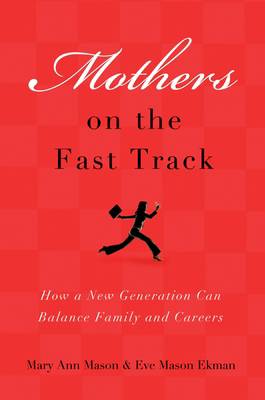
- Retrait gratuit dans votre magasin Club
- 7.000.000 titres dans notre catalogue
- Payer en toute sécurité
- Toujours un magasin près de chez vous
- Retrait gratuit dans votre magasin Club
- 7.000.000 titres dans notre catalogue
- Payer en toute sécurité
- Toujours un magasin près de chez vous
Mothers on the Fast Track
How a Generation Can Balance Family and Careers
Mary Ann Mason, Eve Mason Ekman
Livre broché | Anglais
18,95 €
+ 37 points
Description
In the past few decades the number of women entering graduate and professional schools has been going up and up, while the number of women reaching the top rung of the corporate and academic worlds has remained relatively stagnant. Why are so many women falling off the fast track?
In this timely book, Mary Ann Mason traces the career paths of the first generation of ambitious women who started careers in academia, law, medicine, business, and the media in large numbers in the 1970s and '80s. Many women who had started families but continued working had ended up veering off the path to upper management at a point she calls "the second glass ceiling." Rather than sticking to their original career goals, they allowed themselves to slide into a second tier of management that offers fewer hours, less pay, lower prestige, and limited upward mobility. Men who did likewise--entered the career world with high aspirations and then started families while working--not only did not show the same trend, they reached even higher levels of professional success than men who had no families at all.
Along with her daughter, an aspiring journalist, Mason has written a guide for young women who are facing the tough decision of when--and if--to start a family. It is also a guide for older women seeking a second chance to break through to the next level, as Mason herself did in academia. The book features anecdotes and strategies from the dozens of women they interviewed. Advice ranges from the personal (know when to say "no," the importance of time management) to the institutional, with suggestions for how the workplace itself can be changed to make it easier for ambitious working mothers to reach the top levels. The result is a roadmap of new choices for women facing the sobering question of how to balance a successful career with family.
In this timely book, Mary Ann Mason traces the career paths of the first generation of ambitious women who started careers in academia, law, medicine, business, and the media in large numbers in the 1970s and '80s. Many women who had started families but continued working had ended up veering off the path to upper management at a point she calls "the second glass ceiling." Rather than sticking to their original career goals, they allowed themselves to slide into a second tier of management that offers fewer hours, less pay, lower prestige, and limited upward mobility. Men who did likewise--entered the career world with high aspirations and then started families while working--not only did not show the same trend, they reached even higher levels of professional success than men who had no families at all.
Along with her daughter, an aspiring journalist, Mason has written a guide for young women who are facing the tough decision of when--and if--to start a family. It is also a guide for older women seeking a second chance to break through to the next level, as Mason herself did in academia. The book features anecdotes and strategies from the dozens of women they interviewed. Advice ranges from the personal (know when to say "no," the importance of time management) to the institutional, with suggestions for how the workplace itself can be changed to make it easier for ambitious working mothers to reach the top levels. The result is a roadmap of new choices for women facing the sobering question of how to balance a successful career with family.
Spécifications
Parties prenantes
- Auteur(s) :
- Editeur:
Contenu
- Nombre de pages :
- 176
- Langue:
- Anglais
Caractéristiques
- EAN:
- 9780195373691
- Date de parution :
- 24-12-08
- Format:
- Livre broché
- Format numérique:
- Trade paperback (VS)
- Dimensions :
- 142 mm x 221 mm
- Poids :
- 249 g







